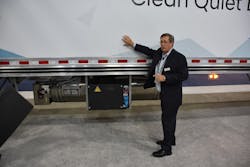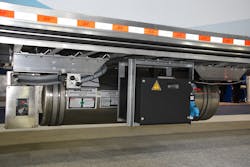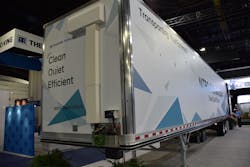ATLANTA. With a focus on sustainability in refrigerated transport, Hyundai Translead has introduced a refrigerated trailer using a cryogenic nitrogen refrigeration technology system. The carbon footprint of the HT Nitro ThermoTech concept trailer, is up to 90% less than a traditional unit, according to Hyundai. Developed in collaboration with global gases distributor Air Liquide, the system was displayed at the North American Commercial Vehicle Show.
“We often hear that good environmental stewardship also makes for good business; this is certainly the case with the Nitro ThermoTech,” said Stuart James, chief sales officer for Hyundai Translead. “Heavy-duty transportation is a vital element of our economy and our very ability to live in the way we are accustomed to. It cannot be denied that heavy-duty transportation is a significant source of carbon-dioxide emissions. This concern with carbon emissions is particularly true at Hyundai, where forward-thinking strategies are being developed and brought to market in an ongoing effort to reduce or even eliminate harmful emissions.”
The HT Nitro ThermoTech concept trailer is optimal for transporting cold chain products. Temperatures are reduced more quickly than a traditional refrigeration unit and maintained with precise control of desired temperatures, Hyundai says. The intelligent control system and independent cooling power maximize thermal efficiency. The HT Nitro ThermoTech concept trailer is not affected by outside temperatures. Maximum power is always available, even when the truck’s engine is off or idling.Additionally, the HT Nitro ThermoTech concept trailer cooling unit is virtually noiseless which significantly reduces noise pollution for drivers as well as at the point of deliveries. This is a significant advantage for night-time deliveries in urban and suburban neighborhoods where noise can be distracting.
“The ‘cold’ is not created on the trailer—it is, in fact, already stored onboard in a vessel mounted under the belly of the trailer and from there it is piped into the cargo-containing trailer body,” said James. “Once the nitrogen has given up its cold and has returned from a liquid to a gaseous state it is then vented back into the atmosphere.”
Moreover, the HT Nitro ThermoTech concept trailer features new, enhanced structural designs. The side wall, front wall, and roof are each constructed as a one-piece, structural sandwich foam panel with Fiber Reinforced Polymer (FRP) skins. The materials are made without posts and roof bows. The one-piece structural foam panel design creates a lighter weight trailer with increased wall strength and enhanced thermal efficiency, while maintaining the same cubic trailer volume. The improved structure panels are bonded to the rails, which reduce thermal bridges, remove potential water intrusion, and provide a cleaner finish.
“In terms of good business, this system, given volume production, can closely parallel the acquisition cost of a traditional refrigeration machine but lifetime costs of ownership and operation will be considerably lower,” James said. “There are almost no moving parts in the system so routine maintenance is reduced to a visual inspection once per year or roughly every two-thousand operating hours. And there are no consumable supplies such as lubricants or filters to be topped-off or replaced.”


